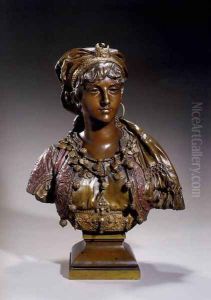Adrien-Etienne Gaudez Paintings
Adrien-Etienne Gaudez was a prominent French sculptor, born in Lyon in 1845 and dying in Neuilly-sur-Seine in 1902. Gaudez embarked on his artistic journey at a young age, showing a profound interest and innate talent for sculpture. He moved to Paris to further his education and artistic career, where he studied under the tutelage of François Jouffroy at the École des Beaux-Arts, one of the most prestigious art schools in France. Gaudez's education under Jouffroy was instrumental in refining his skills and shaping his artistic sensibilities, grounding him in the traditions of French sculpture that he would both embrace and challenge throughout his career.
Gaudez quickly established himself as a sculptor of note in the bustling Parisian art scene of the late 19th century. His works often reflected the Romantic period's fascination with history, myth, and legend, embedding a sense of dynamism and vitality in bronze that became his signature medium. One of his most celebrated works, 'Alfred de Musset', showcased his ability to capture the spirit of his subjects, marrying technical prowess with emotional depth. Gaudez's sculptures were well received, earning him recognition and accolades, including medals at the Paris Salon, an influential art exhibition that was a critical platform for artists seeking to gain prominence.
Throughout his career, Gaudez remained committed to the craft of sculpture, exploring various themes and subjects that ranged from historical figures to allegorical scenes. His style evolved over time, reflecting the shifts in artistic trends and the broader socio-political changes occurring in France and across Europe. Despite the evolution of his work, Gaudez maintained a consistent quality and dedication to the essence of sculpture as a form of expression and communication.
Gaudez's contributions to French sculpture were significant, not only in terms of his own body of work but also in his influence on contemporaries and future generations of sculptors. His pieces are part of several prestigious collections and museums, testament to his enduring legacy in the world of art. Adrien-Etienne Gaudez passed away in 1902, but his sculptures continue to captivate and inspire, serving as a bridge between the traditions of the past and the possibilities of the future in the realm of sculptural art.
